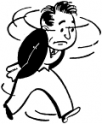Put the wind up
Beyond cold feet.
Dear Word Detective: I know that “put the wind up” means to make someone nervous or upset, but wonder about the origin. I had an elderly aunt who often complained of feeling cold air flowing up her nose (of such tales are word origins made) and have found myself using the phrase “put the wind up someone’s nose” which I now think was my own elaboration. But the question of what or who the wind is being put up and why and where the concept originated remains. — Alex Pirie.
And a great question it is. “Put the wind up,” meaning “to alarm or make nervous,” as well as its close cousin “to get the wind up” (to become alarmed), both date to just after World War I, and are more often heard in the UK than in the US. The origin of  the phrases apparently lies in the armed services slang of WWI (“Shells so close that they thoroughly put the wind up a Life Guardsman in the trench with me,” Wilfred Owen, 1918). But both phrases are still very popular, as can be seen in a recent headline from the UK-based technical website The Register, reporting on US alarm at the theft of a UK government computer containing various secrets: “MoD laptop thefts put the wind up the US.”
the phrases apparently lies in the armed services slang of WWI (“Shells so close that they thoroughly put the wind up a Life Guardsman in the trench with me,” Wilfred Owen, 1918). But both phrases are still very popular, as can be seen in a recent headline from the UK-based technical website The Register, reporting on US alarm at the theft of a UK government computer containing various secrets: “MoD laptop thefts put the wind up the US.”
Evidently, the origin of “put the wind up” is considered a bit of a mystery. The Oxford English Dictionary is silent on the matter, and most of my reference works don’t even mention the phrase.
I hesitate to even suggest this, because I fear it will awaken the demented munchkins of CANOE (the Committee to Ascribe a Naval Origin to Everything), but it occurred to me upon reading your question that “put the wind up” might have something to do with the age of sail, when the wind rising and filling the sails of a becalmed ship would cause it to begin to move. Perhaps, metaphorically, “put the wind up” described a similar process in an individual.
Fortunately, I don’t have to limp home on my lame theory, because the eminent etymologist of slang Eric Partridge came up with a far better explanation years ago. In his Dictionary of Slang and Unconventional English, Partridge related (and endorsed) the theory of one of his readers that the phrase comes from a sardonic parody of a standard British Army marching song of the WWI period called “The British Grenadiers.” The “improved” version, popular among enlisted men, contained the lines “Father was a soldier, at the Battle of Waterloo, the wind blew up his trousers, and he didn’t know what to do.” Soldiers sang this song as they marched off to war, and soon, according to this theory, anyone who was flustered or anxious was said to “have the wind up his trousers,” eventually shortened to “have (or get) the wind up.” As Partridge’s correspondent notes, the fact that the song definitely existed, and contained those words, makes this theory highly likely to be true.
Page 1 of 2 | Next page
